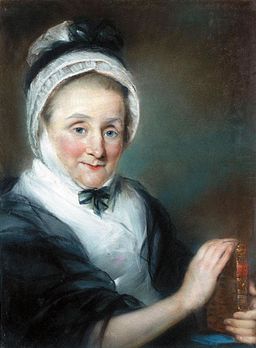I don’t know about you, but I love the idea of pseudonyms. They’re the modern equivalent of the secret identity, and if there’s one ploy I am fond of, it is the secret identity.
Many and varied are the pseudonyms I have fancied using, but (alas!) I can’t write fast enough to furnish them all with material; and in any case there’s little sense building up multiple reputations where one would do. And since I eventually realized that not everything I dream of writing would sit well under the name of Sinistra Inksteyne, I revealed my own, rather prosaic identity. Sinistra is a much less prosaic identity: she’s the sort of person who’d wear a hat like this:
 without giving it a second thought, black lace streamers and all.
without giving it a second thought, black lace streamers and all.
My everyday identity may have been revealed, but the urge to create pseudonyms has not abated. Dormant for some time, it sprang anew to life when I discovered (thanks to Wikipedia) that there have been no less than four baronets of Great Britain rejoicing under the name of Page-Turner. I kid you not, Page-Turner. Sirs Gregory, Gregory Osborne, Edward George Thomas and Edward Henry.
And to my knowledge, not one of them attempted to become a best-selling novelist, or indeed a writer of any stripe. This is a scandalous waste of a name that screams best-seller in every stroke. Unfortunately what the authorities are pleased to call the 1733 creation still has issue, which is a complicated way of saying that while the name is no longer in use, someone’s still got dibs on it. (Sir John Dryden, at present.)
Excuse me while I change my hat for a cap with black ribbons in token of my sorrow at opportunities lost. 
Thank you. Now then! Not being the kind of person who will recommend to others advice which she will not take herself, I had a stab at the pen-name generator I recommended to you earlier this week. Most of the fields I was able to fill in without too much trouble (a positive adjective took me some time, and the make of my first car was flatly impossible) and the generator promptly presented me with a bewildering array of options, helpfully sorted by genre.
Some were pretty reasonable: D.C. Makepeace (general fiction), for example, or D.C. Dominics (fantasy). Even Crispin Makers isn’t too bad, if you don’t object to the name of Crispin. Then there were the positively strange: Dequorah C. Makarios (science fiction) or D.C. Mazazioz (ditto).
D.C. Derringer-Blackios (crime) has something of a ring about it, but I positively and flatly refuse to call myself Dagbjot Jaguar Makarios (fantasy). For one thing, I can’t pronounce it, and for another, I should never be able to look myself in the face again. I can’t anyway, since it’s a physical impossibility, but even if I could, I shouldn’t. The embarrassment would be too much to be borne by living flesh. I should have to veil my face at all times like Medusa, lest I inadvertently catch my own eye and turn myself to stone.

But worse was to come. Deb Carolyn Wittykins sounds like the kind of person who knits toilet-roll cozies in the shape of kittens and speaks to everyone as though they were five years old. Bad. But not so bad as – can I even bring myself to mention it? Alas, in the interests of honesty, I fear I must. Let us have it out at once and let the subject drop forever. But I must plead with you, my readers, for the good of mankind: if I ever start publishing romances under the name of Debs-Anne Wittyflower, please hunt me down and kill me. It’s the only thing to be done.

The modern problem with pen names is that nothing is really secret. There was never a question of who Lemony Snicket was, only of whether you wanted to spoil the game by looking him up. The idea behind a pseudonym is anonymity, so you can be famous and still go grocery shopping in your shabby flats with the holes on the side without anyone caring. It’s nice if you live in a closed society and don’t want to make a stir, but makes it more difficult to get book deals and it effectively prevents you from attending signings or late night shows.
It’s still my ultimate goal, though, to publish under such a cloak of obscurity.
“The idea behind a pseudonym is anonymity” – indeed! Mind you, there are also reverse-pseudonyms, such as when Salman Rushdie published under his own name but lived under the name of Joseph Anton.
In any case, one of the benefits of being a writer as opposed to, say, an actor or singer, is that people don’t necessarily know what you look like, so you can still shop dressed however you please 🙂 Good luck with your Cloak of Obscurity!
Nothing is really secret? Well, maybe not forever, but Satoshi Nakamoto’s identity is still uncertain, and Deep Throat had a fairly good run until he owned up (though one person’s early speculation turned out to be correct, which may well turn out to have been the case with Satoshi Nakamoto, too).
Mm… It may be easier to maintain anonymity with technological work than with writing, since writers tend to have a recognizable voice. It’s not necessarily impossible, but it’s difficult. Especially once you’re on the internet and leaving a digital trail.